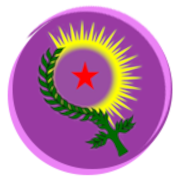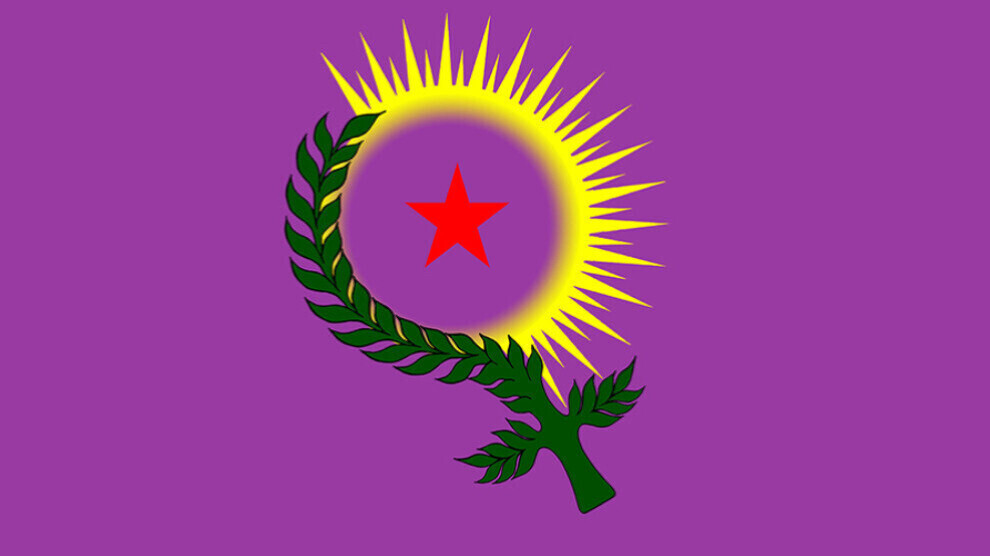Women’s Liberation Ideology
The Women’s Liberation Ideology which was declared on March 8th, 1998 is the basis of the Kurdish Women’s Movement in carrying out the struggle for the vitalisation of the Democratic, Ecological and Women’s Freedom paradigm.
The Kurdish freedom struggle, which is credited with some of history’s firsts, has resisted capitalist modernity through the women’s liberation movement which is seen as the liberation of societies and humanity as a whole. In this sense, the Kurdish women’s movement, which leads the Kurdish struggle, has an ideology which is distinct from all other organisations.
At first glance, although it may seem like the women’s liberation ideology purely covers matters relating to the female sex, this is not the case. It is neither a purely sex-based ideology nor a feminist approach. The women’s liberation ideology aims to resolve all social problems through a female lens and to understand the world within a female perspective. In other words, it isn’t limited to only solving women’s problems but also provides solutions to wars, ecological disasters and profit-driven economic policies. It puts up great struggles to achieve peace that is based on freedom and it is an alternative to all male dominated and patriarchal ideologies. However, one should not mistake this ideology as being a system of thought which operates in the same way that class-based societies do.
The women’s liberation ideology is now at the forefront of history; after the end of the Neolithic period and the downward spiral of civilisation and statism, the history of humankind has finally lifted itself up on its feet and is leading the way forward into the future.
There are five basic principles of the women’s liberation ideology.
The principles are as follows:
- To live freely in one’s own birthplace. Patriotism.
- Free thought, free will.
- To be organised and to partake in a free life.
- To be organised and willing to struggle.
- An aesthetic life based on creativity.
On the basis of these principles, it can be seen that the women’s liberation ideology targets all aspects of society and aims to be a solution to all kinds of societal problems. In other words, it is based on resolving contradictions that occur from class conflict, gender conflict to social-ecological problems and societal-individual problems. Therefore, to consider this ideology as the liberation ideology of society as a whole would be the right approach to take. However, it isn’t possible to consider the women’s liberation ideology independently from Ocalan’s ‘break’ theory. When we examine the Kurdish freedom struggle and in particularly the history of the Kurdish women’s movement, it can be seen that the ‘break’ theory, the mobilisation of women and the struggle and resistance that women have shown throughout history is what has brought the Kurdish woman to the women’s liberation ideology. In this sense, nothing is formed independently of another.
Throughout history’s struggle for freedom, humans have always sought to create their own alternatives. The women’s liberation ideology is a clear example of this. It is important to note that the social relations that exist in today’s world are based on ownership where man has alienated himself and is estranged from nature. Because male dominated power was primarily developed on the subjugation and ownership of women, the patriarchal mentality is one of slavery, authoritarianism and hierarchy. In this sense, the ‘break’ is not just a physical break away from the man but from his dominance, ruler mentality and his patriarchal system.
To take steps towards liberation, first of all, there must be a questioning of the logic for private property between the sexes, including all forms of hierarchal thinking and mentality. This questioning can free the individual of self-interest and the thirst for power, dismantling unhealthy, co-dependent relations. The disappearance of co-dependent relations will enable both men and women to meet one another with a renewed perception of life that is based on true equality and freedom. In other words, the ‘break’ will be a purification from all hierarchal, domination-based and self-centred ways of being. This means reaching for the truth; to return back to one’s true nature.
In conclusion, the Kurdish women’s movement, throughout the history of the Kurdish freedom struggle, has participated in the revolution in Kurdistan since the late 1970s to the early 1990s; with the union of YJWK in 1987 (Yekitiya Jinên Welatparezên Kurdistan – Kurdistan Patriotic Women’s Union), their mobilisation in 1993, then in 1995 the YAJK (Yekitiya Azadiyê Jinên Kurdistan – Kurdistan Free Women’s Union), in 1996 with the ‘break’ theory and in 1998 with the Women’s Liberation Ideology, Free Life and Male Transformation Project as well as experience as an official party through the 2000s. They have experienced revolutionary struggles and embodied freedom in the spirit of the times by experimenting with social contract and the confederalism of women. Through this on-going struggle to create long-lasting solutions for social and communal problems and providing education on the importance of social revolution, this process developed and systematised the scientific methodological system we know as Jineolji which serves as an alternative in the search for a new life against the given system. Jineoloji which works to implement the democratic, ecological, female libertarian paradigm, is successful because it is able to renew and enrich itself through practical methods of trial and error. For this reason, the women’s liberation ideology, the ‘break’ theory, including the legacy of the on-going experimentation, forms the basic ideology of the Kurdish women’s movement. This ideology is the cornerstone of the women’s struggle around the world and for us to be able to transform our unwritten stories and slavery into history and freedom.
For further information:
http://www.yjastar.com/tr/bolumler/guencel-yazlar/56-tarihin-en-anlamli-devrimi-kadin-kurtulus-ideolojisidir
http://ayrintidergi.com.tr/kurt-kadin-hareketi-deneyimine-bir-bakis/

